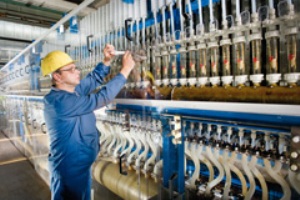A new technology from Bayer and ThyssenKrupp that is now being launched commercially worldwide enables the production of chlorine with significantly less electricity. The process reduces the very large amount of energy required to obtain the important chemical by as much as 30 percent compared with conventional processes. Its widespread use would enable economically significant savings of energy.
 Chlorine production with less electricity: Electrolysis cell with new technology from Bayer and ThyssenKrupp. Image author: Bayer MaterialScience AG
Chlorine production with less electricity: Electrolysis cell with new technology from Bayer and ThyssenKrupp. Image author: Bayer MaterialScience AG
The new oxygen depolarized cathode (ODC) technology is used for the electrolysis of table salt, by which means 95 percent of all chlorine is produced. The element is a central basic material in the chemical industry and is required for some two-thirds of all products, including plastics, medicines and crop protection agents.
Considerable interest among chlorine producers
The ODC technology successfully completed two years of industrial-scale trial operation. Performed in a demonstration plant at Bayer’s Krefeld-Uerdingen site in western Germany, this provided the foundation for the commercialization of the process. The development partners Bayer MaterialScience and ThyssenKrupp Uhde / UHDENORA have agreed to offer the technology worldwide. There is already considerable interest in the chlorine industry.
“The new process can make a significant contribution to energy efficiency and thus to the sustainable transformation of energy systems,” says Dr. Tony Van Osselaer, member of the Board of Management of Bayer MaterialScience. In Germany alone, 100-percent deployment of the technology would save one percent of the total electricity demand. “This corresponds to the energy consumption of a major city such as Cologne,” Van Osselaer adds. There is also a positive effect on the climate, as carbon dioxide emissions as the result of power generation would also be reduced by one-third.
“The new process can offer significant ecological and economic advantages,” says Alfred Hoffmann, member of the Executive Board of ThyssenKrupp Uhde. “However, conditions at the production sites also play a role.”
Thyssen Krupp Uhde / UHDENORA will be responsible for global marketing, and Bayer MaterialScience will supply the oxygen depolarized cathodes as part of the non-exclusive collaboration. The chemical company developed this special type of electrode, whereas the design of the electrolysis cell originated with Thyssen Krupp Uhde / UHDENORA.
Fewer volts with special electrode
The new technology is based on the membrane technology used in chlorine alkali electrolysis, which is the now the standard for the production of chlorine. This process typically produces chlorine, caustic soda and hydrogen from table salt and water.
With the ODC technology, the electrode normally used to produce hydrogen in the membrane process is replaced by an oxygen depolarized cathode. The addition of oxygen suppresses the formation of hydrogen at the cathode, which is the negative pole. The only products are chlorine and caustic soda. This reduces electricity consumption by as much as 30 percent.
Source: http://www.bayer.com/